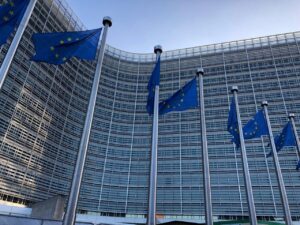If the coalition talks in Germany fail, the country will be facing new elections. Contrary to the coalition of Christian democrats, liberals and greens, which has not come into being, the potential return of the Great Coalition of Christian democrats and socialists is a sign of slowing down the energy turn and defending Nord Stream 2. The Commission and Poland together are defending an initiative that may delay or even block Nord Stream 2 against Germany, as recognised by the EUROGAS industry organisation – writes Wojciech Jakóbik, editor-in-chief of BiznesAlert.pl.
Fall of Jamaica and uncertainty of the Great Coalition
No coalition was formed, which Poles counted on. The Christian democrats, liberals, and greens have not reached agreement. I wrote that the so-called Jamaican coalition could potentially lead to a change in Germany’s position regarding the Nord Stream 2 gas pipeline, a project criticised in Central and Eastern Europe, including Poland, because it would strengthen the position of Russian Gazprom in the region and harm competition.
Coalition talks between Christian democrats from the CDU and the CSU and socialists from the SPD have touched upon all important topics apart from immigration policy. Conservatives forced a slowdown in the Energiewende, the energy turn, by moving away from coal. Jamaica was able to keep the course towards the turn and revise its position with regard to Nord Stream 2, as I wrote in the portal. Discussions on the subject have not been successful.
According to BiznesAlert.pl, the deadline for achieving a 40 per cent reduction in carbon dioxide emissions in relation to 1990 was postponed from 2020 to 2030. It has also been agreed that the share of renewable energy sources in the energy mix would be 45-55 per cent by 2025 and 65 per cent by 2030. This means shortening of the prospects in relation to earlier emission reduction plans by 95 per cent and the RES share at the level of 80 per cent by 2050, and meeting the demands of the Christian democrats who are afraid of increasing costs of the energy turn, described in Piotr Grzędzik’s report on BiznesAlert.pl.
Delay or blocking of Nord Stream 2
Nord Stream 2 was not a contentious topic in the talks about returning to the Great Coalition. Despite the lack of a new government, Berlin is defending this project internationally. In Brussels, German diplomats are stalling for time in the lex Nord Stream 2 case, which is a revision of the Gas Directive in such a way as to enable the project to be regulated in accordance with EU law, but it is likely to delay its implementation by having to negotiate the assumptions. If Moscow rejects talks, it is also possible for the European Commission to block the project, as was the case with the disputed South Stream. Germany is committed to ensuring that any possible regulation cannot be extended to Nord Stream 2 due to the project being too advanced. It is worth noting that the construction has not yet started. The project awaits environmental approvals in Scandinavian countries.
Germany’s resistance to lex Nord Stream 2 means that not only the socialists are defending the project, but also Germany’s entire diplomacy, contrary to the optimistic hopes for a different position of the conservatives. Meanwhile, Foreign Minister Sigmar Gabriel from the SPD maintained his defence of the project, confirming it with another critical stance against the threat of US sanctions that could undermine the profitability of Nord Stream 2 to the extent that it would condemn Gazprom to implement it alone. Therefore, the position of the socialists has not been changed.
It is necessary to seek German influence on the position of the EUROGAS gas industry organisation, which has taken a critical stance on the lex Nord Stream 2. In their opinion, the European Commission’s proposal will bring more losses than benefits, as it will hit other projects that already exist: Algeria-Spain (Medgaz), Libya-Italy (Green Stream), the Maghreb-Europe Pipeline (Morocco-Spain), and the EastMed (Israel-Greece). However, the proposal, which Beata Płomecka from the Polskie Radio informs us about, may respond to these concerns. It is possible to exempt pipelines built before October 2017 from the regulation.
According to EUROGAS, it will also undermine the sovereignty of Member States in the choice of energy sources. The organization also notes that the new law may delay Nord Stream 2 because it believes that it will require retroactive modifications to the law through derogations that will be „time-consuming”. – From the point of view of investment security, it is possible to question the attempts to include the commenced investments in the new law, because certain investments have already been made and investors have the right to expect a stable legal environment – as indicated by EUROGAS. According to the organisation’s experts, it will take „a few years” to conduct the possible adaptation of the financial, political, regulatory, and legal framework. – The risk of security of investments and procedures may delay, halt or exclude new gas pipeline projects – as stated explicitly by EUROGAS.
Conclusions for Poland
Gazeta Wyborcza Daily reports that on 21st January in Bonn there will be a CDU/CSU congress, at which a final decision on the possible renewal of the coalition with socialists will be announced. If no compromise is reached, Germany will be waiting for the first repeated elections after the Second World War. Apart from that, Berlin is still defending Nord Stream 2 and is stalling for time against the European Commission’s initiative supported by Poland.
Poles and Brussels together in defence of the Community’s energy policy against Berlin, which insists on the exceptional treatment of Gazprom’s project? From the Polish point of view, it is a comfortable situation in terms of the image, which allows to improve Warsaw’s standing after the dispute over the reform of the judiciary. – I am compelled by the fact that the European Commission wants to be on the side of countries such as Poland, which are showing the risks of monopolisation of the gas market – said Prime Minister Mateusz Morawiecki, quoted by the Polish Press Agency, when referring to the Nord Stream 2 project. However, speculations that Poles were willing to let Nord Stream 2 go in exchange for Germany’s concessions on mines have not been confirmed.








